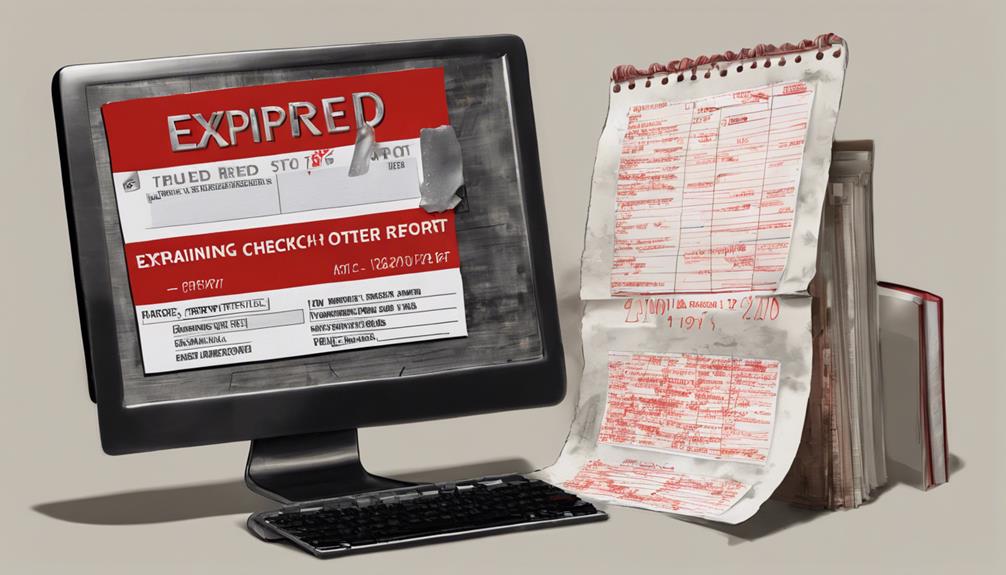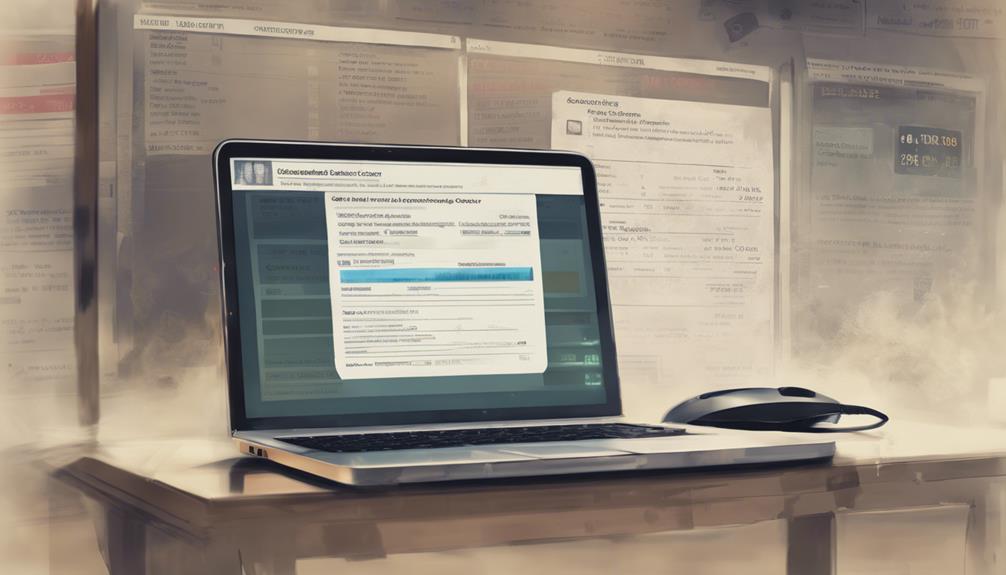Background checks generally cover a 7-year span for most purposes, but can vary based on factors like sealed or expunged records and specific industry rules. Depending on the nature of the check, the timeframe may extend to 10 years. Be aware of nuances like sealed or expunged records that affect disclosure. For more details on different types of background checks and specific guidelines, explore the additional information provided in the Texas and Federal Background Check Guidelines sections.
Key Takeaways
- Standard background checks typically cover a 7-year period.
- Some industries require checks dating back 10 years.
- Federal background checks offer comprehensive adult history reviews.
- Expunged felony convictions may not be disclosed.
- Misdemeanor arrests over 7 years old may not appear.
Criminal Background Check Timeframes

Criminal background checks in Texas typically look back seven years for most non-criminal justice purposes. When employers or individuals request a background check report, misdemeanor criminal offenses older than seven years may not appear in the results, depending on the nature of the check.
However, felony convictions, unless sealed or expunged, could still surface in the background check process, impacting the individual's record visibility.
For industries like transportation, background checks in Texas might extend the timeframe to ten years to ensure thorough screening of applicants.
Private citizens conducting background checks through the Texas Department of Public Safety (DPS) may have access to records beyond the standard seven-year period, allowing for a more detailed review of an individual's criminal history.
It's essential for both employers and individuals to understand these nuances in the background check guidelines to make informed decisions based on accurate information.
Federal Background Check Guidelines
Federal background check guidelines provide in-depth screening of individuals' criminal history for federal court cases, offering insight into their lifetime records.
FBI background checks are pivotal in uncovering criminal history from any point in adulthood, guaranteeing a detailed review of an individual's background.
Fingerprint background checks play a critical role in accessing historical information, enabling thorough screenings to reveal any potential red flags.
Level 2 background checks, which are specialized fingerprint checks, go even further in providing in-depth criminal history information for thorough assessments.
Employers often turn to services like GoodHire background checks to comply with federal guidelines, as these checks offer various options to ensure compliance with federal, state, and municipal laws.
Expunctions and Sealed Records

Expunctions and sealed records play an essential role in managing criminal history visibility.
Understanding the eligibility criteria for expunction and the impact of sealed records is vital.
These points shed light on how past criminal records can affect background checks.
Expunction Eligibility Criteria
During the expunction process in Texas, individuals must meet specific eligibility criteria for felony and misdemeanor arrests to have their records cleared. This process involves filing a petition with the court, initiating a legal procedure that can take up to a year for records to be destroyed.
Once the expunction is granted, the records are removed from public access, meaning they shouldn't appear in most background checks.
On the other hand, sealed records, while also restricted from general accessibility, may still exist in certain government agencies' databases. Sealed records are typically invisible in standard background checks post-sealing, although they aren't entirely erased.
It's essential for individuals seeking to clear their criminal records to understand the distinction between expunction and sealing, as each option has its own set of implications for background checks and record visibility.
Impact of Sealed Records
After the expunction or non-disclosure process in Texas, the impact of sealed records on background checks is significant. Sealed records resulting from expunction or non-disclosure may not surface in standard employment background checks, affecting their visibility in background screenings.
While expunged records are eliminated from public access, sealed records might still be accessible to specific government agencies for legal purposes. Private companies conducting background screenings may need to take additional steps post-expunction to update their databases and eliminate sealed records from consideration.
In Texas, employers are generally prohibited from using sealed or expunged records in making hiring decisions. This highlights the importance of understanding the implications of sealed records on background checks, especially in jurisdictions like Texas where expunction and non-disclosure play an important role in maintaining individuals' privacy and second chances.
Legal Consequences of Background Checks
Legal repercussions of background checks can include being denied opportunities such as employment, housing, or loans.
Providing false information during a background check process can result in negative outcomes.
Disputing inaccuracies in a background check report is essential to avoid legal challenges.
Legal Implications of Checks
Background checks may have significant legal implications for both employers and individuals. When conducting background checks, employers must comply with federal laws such as the Fair Credit Reporting Act (FCRA) and guidelines set forth by the Equal Employment Opportunity Commission (EEOC). These regulations dictate how criminal records can be utilized in the hiring process, ensuring fair treatment of candidates.
While federal laws don't impose a specific time limit on reporting criminal convictions, some states restrict the reporting of misdemeanors to a maximum of seven years. Additionally, certain states may have statutes that limit how far back background checks can go for specific types of offenses. It's essential for employers to understand and adhere to these state laws to avoid legal repercussions.
Employers must be cautious when considering an individual's criminal history in hiring decisions to prevent potential discrimination. Understanding the legal implications of background checks is vital to maintaining a fair and compliant hiring process.
Consequences of Background Screening
Conducting thorough background checks is essential for employers to avoid potential legal consequences, particularly when it comes to negligent hiring lawsuits and compliance with federal and state regulations.
Failure to perform comprehensive background checks can lead to significant risks and implications for employers. Inaccurate or outdated information in background checks may result in discrimination claims and legal actions, exposing companies to liabilities.
Employers must make sure that their background screening processes adhere to federal and state laws to mitigate potential penalties and fines. Violating regulations set forth by the Fair Credit Reporting Act (FCRA) regarding background checks can have serious consequences, including legal actions and financial repercussions.
Understanding the legal implications of background screening is vital for organizations to navigate the complexities of hiring practices responsibly. By prioritizing compliance and accuracy in background checks, employers can protect themselves against the legal pitfalls associated with negligent hiring and regulatory non-compliance.
Texas Background Check Overview

When seeking employment or evaluating individuals for certain roles, entities in Texas typically review the last seven years of an individual's background.
However, certain industries, such as transportation, may necessitate background checks dating back up to ten years within the state.
Private citizens utilizing Texas DPS checks for personal reasons may access records beyond the standard seven-year period, offering a more comprehensive view.
The depth and duration of Texas background checks vary depending on the specific context and the entity conducting the check, allowing for tailored assessments.
- Variability in Lookback Period: Industries like transportation may require background checks dating back ten years in Texas, exceeding the standard seven-year lookback period.
- Record Accessibility: Private citizens using Texas DPS checks for personal reasons can access records beyond the typical seven-year scope, providing a more detailed background overview.
- Impact of Restrictions: Restrictions in Texas, such as age at conviction and expungement status, can influence the visibility of certain records in background checks, affecting the depth and duration of the screening process.
Content of Texas Background Checks
Texas background checks encompass a seven-year scope of criminal history, managed by the Texas Department of Public Safety.
Employers must be aware of the inclusion criteria for sealed or expunged records that may not appear in background checks.
Varying timeframes exist for different components of background checks in Texas, necessitating thorough consideration during the process.
Background Check Coverage
Background checks in Texas typically encompass the last seven years of an individual's criminal and court history. However, there are certain nuances to take into account regarding background check coverage in the state:
- Industry Specific Requirements: Industries such as transportation may necessitate background checks dating back ten years in Texas, exceeding the standard seven-year period for some sectors.
- Access for Private Citizens: Private citizens in Texas utilizing Department of Public Safety (DPS) checks for personal reasons may access records beyond the standard seven-year period, providing a broader scope of information.
- Limitations on Disclosure: Misdemeanors older than seven years may not be disclosed in background checks conducted in Texas, potentially affecting the thoroughness of the report.
Additionally, sealed or expunged felony convictions in Texas may remain hidden from employers during background checks, impacting the information available to them.
Record Inclusion Criteria
In Texas, the content of background checks typically includes information spanning the past seven years for employment screening purposes. However, certain industries, such as transportation, may necessitate checks reaching back ten years. Private citizens conducting criminal background checks through the Department of Public Safety (DPS) in Texas may have access to records beyond the standard seven-year timeframe. It's essential to note that misdemeanor arrests older than seven years might not be revealed in these employment background checks. Additionally, sealed or expunged felony convictions could be concealed from employers during Texas background checks.
| Record Inclusion Criteria | Details |
|---|---|
| Criminal Background Check | Spans seven years for most employment checks. |
| Sealed Felony Convictions | May not be disclosed to employers. |
| Expunged Felony Convictions | Could be hidden from employers. |
| Misdemeanor Arrests | Older than seven years may not be revealed. |
Timeframe Considerations
Timeframe considerations for the content of background checks in Texas depend on various factors, including the type of record, the purpose of the check, and the entity conducting it.
When it comes to background checks in Texas:
- Standard Timeframe: Employment background checks in Texas typically cover the past seven years, aligning with FTC guidelines. This timeframe is commonly used for various industries and positions.
- Industry-Specific Requirements: Certain industries, such as transportation, may necessitate background checks dating back ten years. These extended timeframes cater to specific industry regulations and safety concerns.
- Varied Access: While private citizens conducting background checks through the Texas DPS may access records beyond the standard seven-year timeframe, Texas law doesn't explicitly limit the use of older criminal records in background checks. This flexibility allows for a more in-depth review when needed, depending on the entity conducting the check and the purpose behind it.
Timeframes for Texas Background Checks

Employers in Texas typically adhere to a seven-year lookback period for conducting background checks in accordance with FTC guidelines. This timeframe is standard for most employment-related background checks in the state.
However, certain industries, such as transportation, may require a background check that extends up to ten years for specific roles. While employers usually focus on the past seven years, individuals conducting background checks through the Texas Department of Public Safety may access records beyond this timeframe.
In Texas, misdemeanor offenses that occurred more than seven years ago may not be disclosed in employment-related background checks. Additionally, sealed or expunged felony convictions are typically not included in background checks conducted by employers.
It's important for both employers and individuals to be aware of these timeframes and disclosure limitations when conducting or undergoing background checks in Texas.
Texas Background Check Laws
Texas law dictates the parameters for conducting background checks within the state. When it comes to Texas background check laws, several key points should be considered:
- Timeframes: For employment purposes, criminal history checks in Texas typically extend back seven years. However, certain industries such as transportation may require checks to look back ten years.
- Access to Records: Private citizens conducting personal background checks through the Texas Department of Public Safety (DPS) may have access to records beyond the standard seven-year limit.
- Disclosure Limitations: Misdemeanors older than seven years may not be disclosed in background checks within Texas. Additionally, sealed or expunged felony convictions mightn't be revealed to employers, depending on the circumstances.
Understanding these regulations is essential for both employers and individuals undergoing background checks in Texas to ensure compliance with the state's laws.
County Resources for Background Checks

County resources in Texas play an essential role in offering access to public information and records necessary for conducting thorough background checks. Individuals and organizations conducting background checks can utilize specific county resources in Texas to obtain relevant information such as criminal history, employment records, and other essential details.
These resources vary across different Texas counties concerning data availability and accessibility. Local government offices or online portals are typically the primary channels for accessing public information and records in various Texas counties. The features and populations of different counties in Texas may influence the depth and accuracy of the background check resources available.
Purpose and Importance of Background Checks
Background checks serve an essential role in ensuring the safety and security of individuals and organizations in various contexts. Employers conduct pre-employment background checks to verify employment and education history, as well as to conduct criminal background checks. Compliance with federal and state laws is pivotal when running these checks, ensuring that the process is fair and legal.
Records must be accurate and up to date, reflecting any relevant information that could impact the hiring decision. Employers typically verify employment, education, and criminal history as part of background screenings, aiming to make informed choices when hiring new employees.
In Texas, common searches include criminal history checks, education verification, and professional license validation. These checks are essential not only for employment purposes but also for housing or other approval processes where safety and security are paramount.
Frequently Asked Questions
How Far Back Do Most Criminal Background Checks Go?
Most criminal background checks typically cover a span of seven years for misdemeanor convictions. However, federal guidelines allow for indefinite reporting of criminal convictions. State laws may impose constraints on the timeframe for background checks, like a seven-year rule.
Will a Felony Show up on a Background Check After 10 Years in Texas?
In Texas, a felony may still appear on a background check after 10 years if the search is thorough. Employers, especially in sensitive roles, could request checks dating back further, potentially revealing older criminal convictions.
What Background Check Do Most Employers Use?
Most employers typically conduct background checks that cover the past seven years of an applicant's criminal history. However, industries like transportation may require a ten-year lookback period. The depth and timeframe vary based on the entity conducting the check.
What Is a Red Flag on a Background Check?
Employers may consider recent criminal convictions, discrepancies in employment history, unethical behavior patterns, poor credit, and inconsistencies in applications as red flags on a background check. These factors could impact hiring decisions.
Conclusion
To sum up, background checks are like peeling back the layers of an onion – revealing a person's past history and potential risks. It's essential for employers, landlords, and organizations to conduct thorough background checks to guarantee safety and security.
Understanding the timeframes, guidelines, and laws surrounding background checks is vital in making informed decisions. Just as an onion has many layers, so too does a person's background – and it's crucial to uncover them all.









